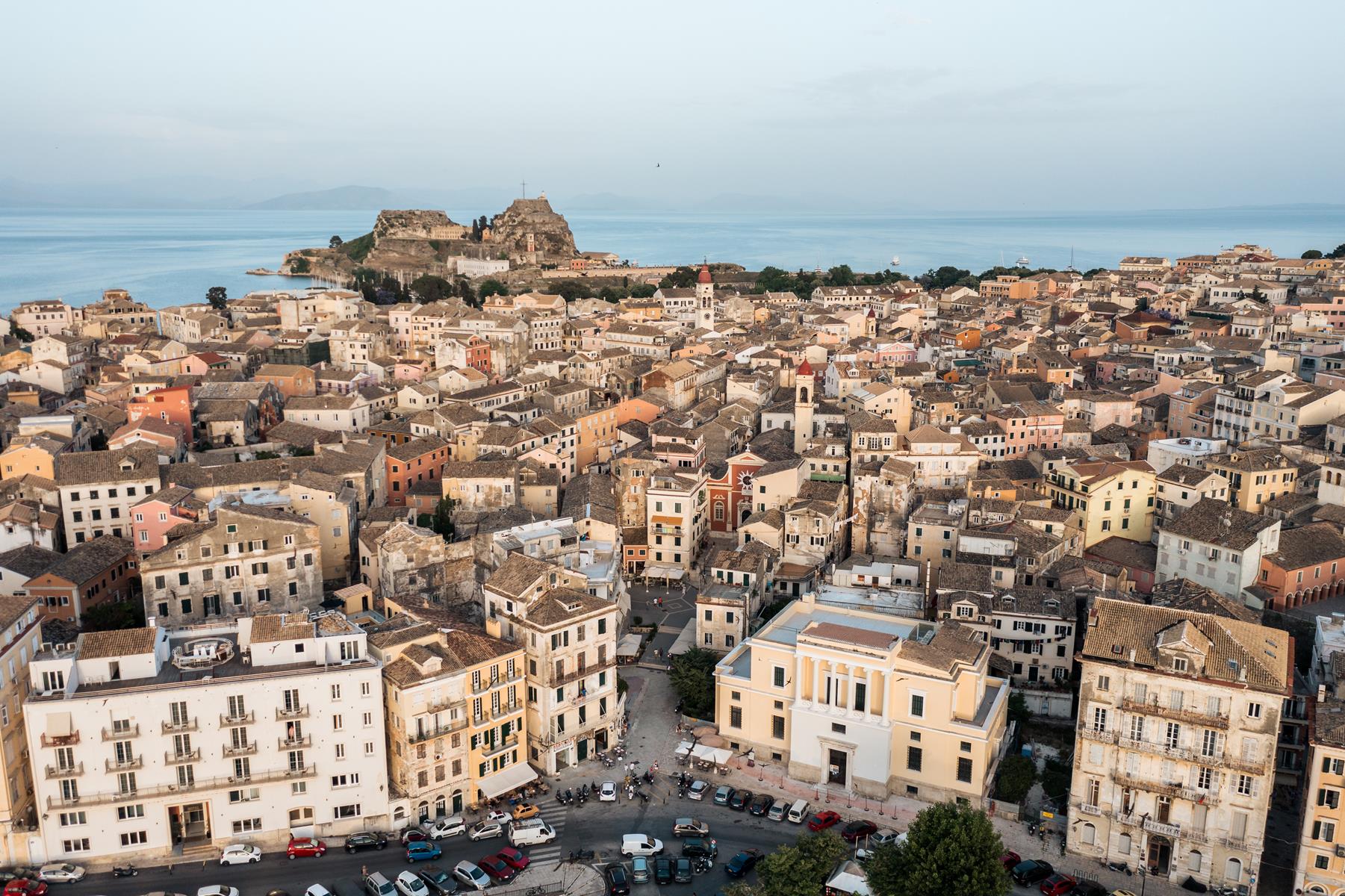Feel like a classic film star in the Old Town
Unesco has declared Corfu’s Old Town a world heritage site. Who couldn’t be impressed by the stately buildings, with neoclassical influences, or fail to be moved by the likes of the Palace of St Michael and St George, Liston Arcade, Reading Society, the Catholic Cathedral, Maitland Rotunda, Ionian Parliament and the Kapodistrias family’s mansion? In the famous alleyways of Campiello, you will feel like a star in a period movie.
Admire the Venetian forts and towers
On the eastern side of town, the rocky shore crowned by two low peaks gave the name Koryfo (or peak) to the island. You enter the Old Fort (Palio Frourio), built in the 13th century, via a bridge over a seawater moat. It includes the Porta Sopranza, the British barracks, two winged lions of St Mark, the Madonna del Carmine, the Savorgnan Bastion, the Tower of Sea and the Tower of the Land (Castel del Mar, Castel della Terra) and the British-built church of St George resembling a Doric temple.
Corfu’s Old Town is often characterised as an open-air museum and each sight is a journey through time. Towering above the northwest border of the capital, the other guardian, the Neo Frourio (New Fort), is a masterpiece of military architecture built by the Venetians between 1572 and 1645. It is a fortress with planes and angles reminiscent of Picasso and Braque’s Cubist periods.
Get your camera ready for Cannon and Mouse islands
Two trademark views on Corfu are actually other islands – the diminutive Pontikonisi, which translates as Mouse Island, just large enough to hold the Pantokrator Monastery, and right next to it, the famous Vlacherna islet, with its 17th-century monastery dedicated to the Virgin Mary, connected to the mainland by a narrow causeway. Mass is held here on Easter Monday.
Go for a swim with a difference at Canal d’Amour and Sidari
Corfu is known for its beaches but you can’t miss the Canal d’Amour, where a natural passage created by the smooth rocks forms a tunnel to swim down. Let us know if you find your soulmate at the end of it, as legend promises. Meanwhile, at Sidari you’ll enjoy spectacular sandy beaches with sandstone formations.
Discover more sandy beaches with amazing waters
Glyfada, Dasia, Ermones, Paleokastritsa, Sidari, Kavos (famous for loud parties), Kontokali, Benitses, Halikounas… The list of beaches is endless, from secluded picturesque coves to large, vibrant stretches of sand with beach bars, tavernas, shops and water sports.
Delve deeper into the many attractions of Corfu
By the village of Paleokastritsa, a lush blanket of green drapes across six rocky coves, with some scholars maintaining that this is the site of the mythical palace of King Alkinoos, where Odysseus stayed. Another highlight is the Monastery of Panagias, founded here in 1225. It reaches as far as the famous Angelokastro, built early in the 12th century, with its church of Agia Kyriaki hidden in a small cave.
Celebrate one of Greece’s most iconic Easter celebrations
Easter celebrations on Corfu are like no other. The island’s Philharmonic Society accompanies the procession of Christ’s epitaph on Good Friday and crowds follow the remains of the island’s patron, St Spyridon, the following morning. And then, on Holy Saturday, it rains botides – clay jars dropped into the streets from people’s balconies. Just make sure you keep looking up!
Feel like an aristocrat in Empress Elizabeth’s Achillion Palace
Corfu’s imperial past is one of the reasons it is considered one of the most glamorous destinations in Greece. Empress Elizabeth of Austria-Hungary, the legendary Sissi, chose the island to build her palace, a place where she found consolation after her son Rudolph’s suicide. It is an elegant Pompeian-style building with luxurious, neoclassical living rooms. In the beautiful gardens, you’ll admire the famous statue of Achilles in his death throes.
Tour Mon Repos, the aristocrat’s choice
British High Commissioner Frederick Adam built this summer residence for his Corfiot wife, Nina Palatianou. Situated in a landscape of rare beauty, it occupies the site of ancient Corcyra, as the city was then called. The villa houses the Palaiopolis Museum and botanical gardens with more than 2,000 plant species that came from the British colonies.
Source : https://www.discovergreece.com/ionian-islands/corfu


